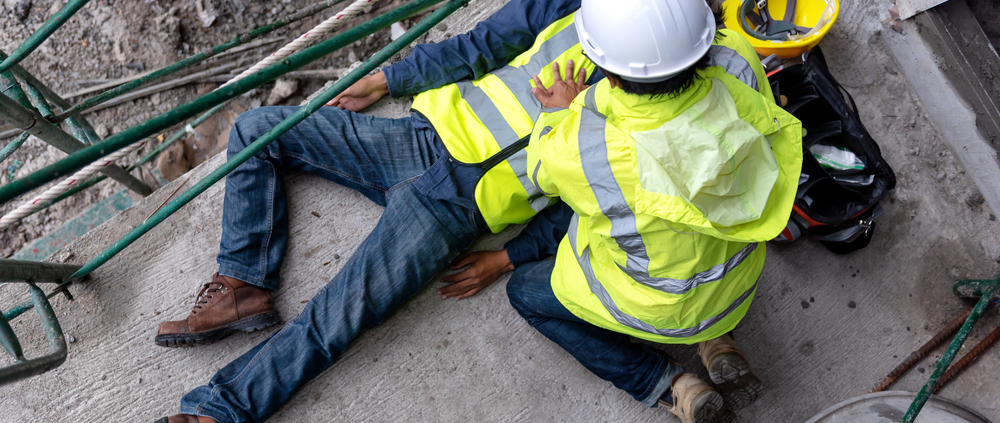A Long Trial Puts a Focus on Who’s to Blame for a Disastrous Construction Accident
By | June 28, 2023
In a rare occurrence, two supervisors face criminal charges over injuries that disabled two workers at an East Harlem building site.
On a mild June morning five years ago this week, a crew of ironworkers were wrestling with large glass and metal panels slated to form the outer wall of a new luxury apartment house on East 126th Street. The assembled panels would span a wide curve in the wall that made the building appear to be leaning back from the sidewalk as it rises 11 stories over its East Harlem block. The building, now complete, comes with a rooftop pool, spa, game room and rents of up to $5,100. In homage to the building’s pleasing curves, it is dubbed “The Smile.”
The smile came at a cruel cost.
Over the past month, prosecutors in Manhattan criminal court have presented testimony along with dramatic video footage and photographs stemming from a horrific accident that occurred at the site on June 25, 2018, as the first wall panels were being set in place. The accident left a pair of workers permanently disabled — one of them with severe traumatic brain injuries.
Two construction supervisors, Timothy Braico, 46, and Terrence Edwards, 44, who were overseeing the installation of the building facade, are each charged with two counts of assault and reckless endangerment that could send them to prison if convicted. At the announcement of the indictments by then-Manhattan District Attorney Cyrus Vance, the city’s then-commissioner of the Department of Buildings, Rick Chandler, called the incident “one of the most appalling safety lapses in recent memory.”
The case is one of the rare instances in which prosecutors have chosen to use criminal sanctions to respond to deaths and serious injuries resulting from the city’s flourishing construction industry. In March, Brooklyn District Attorney Eric Gonzalez won the conviction of a contractor in the 2018 death of a laborer who was killed by tons of falling debris, the third such conviction in the city in recent years.
The trial, which is expected to run well into the summer, has also raised something of a moral mystery: Who is responsible for an accident that never should have happened? Is it the supervisors anxious to avoid delays that can lead to tens of thousands of dollars in added costs, a careless machine operator, or more broadly, a business scarred with incidents that put profit over safety?
In addition to that tangle, a critical criminal justice issue entered the mix late last week when defense lawyers argued that, despite nearly five years of pretrial litigation in the case, prosecutors had never provided them with vital information helpful to their clients despite rules obligating the district attorney to do so. Such “Brady violations” have bedeviled innumerable prosecutions, leading to recent dismissals of cases against police officers and others.
The Prosecutors’ Case
According to prosecutors, the supervisors at the Harlem site allowed an unlicensed and untrained operator to run a so-called “mini-crane” — a mobile machine capable of lifting large loads in small areas — despite not having obtained a city permit for its use. While hoisting a heavy glass panel, the overloaded mini-crane collapsed, sending the machine, which had not been tied down, tumbling off the side of the building.
As it fell, the crane’s long boom jackknifed into the floor below where two members of the iron workers’ union, Jorge Delgado and Christopher Jackson, had been trying to guide the panel into place. Delgado was knocked to the floor, suffering spinal injuries. The boom snagged Jackson’s safety rope, flinging him out into the open air and the street below as the crane smashed to the ground beside him.
“There was a groaning noise and a loud boom. The workers were screaming, ‘Oh my God, someone fell,’” Gideon Kipperman, an architect working for the project’s general contractor, testified.
Jackson, who is 44, lay in a coma at Harlem Hospital for five days after his fall. He has been in a series of rehab facilities ever since but remembers little of that morning. “He can’t walk without assistance,” Manhattan Assistant District Attorney Adam Maltz told Acting Supreme Court Judge Maxwell Wiley, who is deciding the case without a jury, in his opening statement. “He has severe mental problems. He constantly needs to be reminded why he can’t go to work.”
The accident, the prosecutor said, took place as the project, which included commercial space on East 125th Street between Lexington and Third avenues and was being developed by Blumenfeld Development Group, was falling behind schedule. Braico’s and Edwards’ employer, Western Specialty Contractors, a subcontractor hired to erect the curtain wall, was being threatened with financial penalties by the project’s construction manager, ZDG, LLC.
Despite a warning from a representative of the ironworkers’ union that his members weren’t certified in the use of the Jekko brand mini-crane that the supervisors had brought to the site, Edwards told the union rep, “I’ve got it covered,” according to the prosecution.
“Their concern was that it would cost them more money to slow down,” Maltz told the judge. “Time was money. The lives of the men were not worth waiting for.”
Lawyers for the defendants have countered that there was more than enough blame to go around. “The People have isolated two men to bear the full weight of responsibility when there are many people involved,” Marc Agnifilo, Edwards’ attorney, told the judge. “Everyone on this site had responsibility.”
So far, a half dozen prosecution witnesses have testified, including the distributor of the mini-crane, the construction superintendent for the general contractor and Jackson’s sister.
Delgado, a 42-year-old father of five who joined the iron workers’ union in 2010, has yet to be called to the stand. But in a deposition for a civil suit stemming from the incident, he said he was still recovering from his injuries. On the morning of the accident, he said he was working alongside Jackson, waiting to fit the panel into brackets bolted to the concrete slab. “I hear a big boom,” he said. “The whole floor shook.”
As he turned, he said, “I saw Chris getting flung out of the building with the corner of my eye.” He felt something strike him in the back and his hardhat went flying. “I pretty much did a somersault in the air,” he said. Unlike Jackson, his own safety harness held him. “Thank God it didn’t break,” he said.
An Abrupt Reversal
Last Thursday, the trial’s slow parade of witnesses was interrupted just as Stephen Lewis, a 33-year veteran iron worker who was operating the mini-crane the day of the accident, arrived to testify as a potentially crucial witness for the prosecution. Before he could take the stand, though, defense attorneys lodged their objection over allegedly not receiving key material from the prosecution that they contend could have helped their case. Their argument has consumed the court for nearly a week.
The evidence related to the dismissal of a summons that Lewis received on the day of the accident from the city’s Department of Buildings. The summons, which carried a potential penalty of $25,000, cited Lewis for operating the mini-crane without permit or license and “causing injuries.”
Defense attorneys claim that Lewis originally told investigators that he had operated a Jekko mini-crane “a handful of times.” His account later shifted, they maintain, after the summons was dismissed and Lewis agreed to cooperate with prosecutors.
The prosecution’s account of events that morning is dramatically different: Lewis was unfamiliar with the crane, they say, and only agreed to operate it at Edwards’ request and after receiving what prosecutors called “limited instruction” on its use from him.
Prosecutors originally insisted that they played no role in arranging the dismissal of the summons, which occurred a few weeks after it was issued — but that assertion changed.
In a pre-trial hearing in May, defense attorney Daniel Horwitz, who represents Braico, pressed for more information about how the dismissal came about. A prosecutor, Meredith McGowan, responded then that her office had no involvement. “We did not, and could not, make any decision about Mr. Lewis’ violation,” McGowan said at the time.
But on the eve of Lewis’s appearance, defense lawyers raised the issue again, prompting an abrupt reversal by the DA. In a letter to the court, McGowan said she had encountered new facts about the matter. “I learned earlier today,” she wrote, “that at some point early in the investigation” former Assistant District Attorney Diana Florence had asked an investigator from the city’s Department of Investigation “to request that the NYC DOB delay or dismiss the violation against Mr. Lewis.”
Once a star prosecutor in the office, Florence led a task force focused on construction-related crimes. She won a conviction in 2016, the first of its kind, against a corporation for its role in the death of a 22-year-old immigrant laborer from Ecuador named Carlos Moncayo who was crushed while digging a trench at a project near the High Line. Florence later championed legislation that called for increasing financial penalties from $10,000 to $500,000 for construction firms found guilty of recklessly causing worker deaths or serious injuries. The bill, dubbed Carlos’s Law, was signed into law last year by Gov. Kathy Hochul.
Florence’s star plummeted, however, after a judge castigated her for failing to turn over a “staggering” amount of evidence until the eve of trial in a major bribery case. The evidence included tens of thousands of emails along with a tape of an interview in which a prosecution witness said under oath that he had never accepted any bribes. The case, along with a number of related indictments, was dismissed.
Florence resigned, acknowledging her error, but saying that she had been the victim of interference and a “hostile work environment.” The following year she ran in the Democratic primary for Manhattan District Attorney. Her campaign won endorsements from a dozen unions, including the iron workers, but she finished fifth with less than five percent of the vote, behind Alvin Bragg, the current DA.
On Tuesday, Ari Wax, a former Buildings Department assistant commissioner, confirmed that the district attorney’s office had requested that Lewis’ summons be dismissed in order to assist their investigation. In an email dated July 12, 2018 that was placed into evidence by Agnifilo, Edwards’ attorney, Wax wrote to another buildings official about the reason for dismissing Lewis’ summons: “The investigators believe him and he is cooperating against more culpable parties.”
Florence, who is now in private practice, is expected to testify Thursday.
A Corporate Trail
Beyond Lewis and the two defendants, two contractors were also investigated by authorities for their roles in the accident, with sharply divergent results. City records show that the Department of Buildings filed several violations against ZDG, LLC, the construction manager on the sprawling project, including ones for allowing the use of the mini-crane without a permit and letting it be run by an unlicensed operator. ZDG appealed the decisions, but administrative judges upheld most of the violations, resulting in more than $87,000 in fines against the firm.
The city hearing officer noted in his decision that a Department of Buildings inspector had reported that ZDG’s construction superintendent, Kevin Hartney, told him on the day of the accident that his firm had “dropped the ball.” Hartney, who testified for the prosecution this month, described his duties on the project as “safety, supervision, and quality control.” In answer to a question from Horwitz, Braico’s attorney, he said he did “not recall” making the statement to the inspector.
Charges against Western Specialty Contractors, the curtain wall installation contractor that employed Braico and Edwards, were resolved early in the investigation when the company agreed to what’s called a “deferred prosecution agreement” with Vance’s office. The agreement called for the firm to retain an independent monitor to watchdog the company’s operations, add enhanced safety training for workers, and fund public service announcements in English and Spanish about the right to a safe workplace. Vance said at the time that the agreement was justified because Western had “cooperated fully” with his investigation.
The CITY filed a Freedom of Information Law request for a copy of the agreement, but attorneys in Bragg’s office stated that its release would “interfere with a judicial proceeding.” The denial has been appealed.
Whatever the trial’s outcome, advocates for worker safety say that the pursuit of the individuals responsible for construction accidents remains an important task. “When there is a criminal prosecution,” said Charlene Obernauer, director of the New York Committee for Occupational Safety and Health, “it’s a much higher deterrent than just civil litigation.”
This story was published on June 28, 2023 by THE CITY.












Leave a Reply
Want to join the discussion?Feel free to contribute!